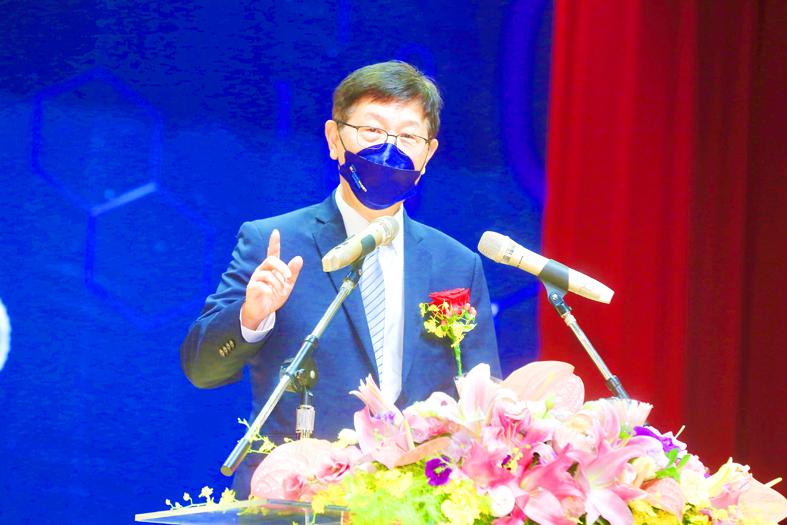Foxconn Technology Group (富士康科技集團) is facing a battle of talent in Vietnam as major suppliers to Apple Inc continue to shift some capacity from China to the Southeast Asian country amid prolonged tensions between Beijing and Washington.
Hon Hai Precision Industry Co (鴻海精密) chairman Young Liu (劉揚偉) said the company’s Chinese rivals in Vietnam have set up operations near its campuses to poach its employees.
Hon Hai is known globally as Foxconn Technology Group.

Photo: Fang Wei-jie, Taipei Times
“The move shouldn’t be condoned,” Liu told reporters in Taipei on Saturday, without naming any companies.
Three of Foxconn’s China-based competitors are now in Vietnam: Luxshare Precision Industry Co (立訊精密) and GoerTek Inc (歌爾聲學) make AirPods in the country, while BYD Co (比亞迪) is preparing to produce iPads.
The key Apple assembly partner employs about 60,000 people in Vietnam, the company’s largest manufacturing base outside of China, Liu said.
Liu said Foxconn plans to “significantly” increase its number of employees in Vietnam over the next one to two years, without providing a specific number.
During former US president Donald Trump’s administration, the US implemented various measures, including tariffs on certain products imported from China, in an attempt to reshape global supply chains.
US President Joe Biden is looking to reconfigure the China tariffs, but US officials have not made major changes so far.
While Foxconn relies on China for most of its production, the world’s largest contract electronics maker has had to make adjustments to mitigate risks from the trade dispute.
The Taiwanese company had planned to move some production of iPads and MacBooks to a new plant in the northern Vietnamese province of Bac Giang, Bloomberg News reported in 2020.
The site was originally slated to begin production last year, with the Vietnamese government saying the company could invest US$700 million that year.
It is unclear whether that site is now up and running, and Liu did not offer an update on the construction progress on Saturday.
Foxconn has been making electronics in Vietnam for several years, dating back to before the US trade dispute with China.

NEW IDENTITY: Known for its software, India has expanded into hardware, with its semiconductor industry growing from US$38bn in 2023 to US$45bn to US$50bn India on Saturday inaugurated its first semiconductor assembly and test facility, a milestone in the government’s push to reduce dependence on foreign chipmakers and stake a claim in a sector dominated by China. Indian Prime Minister Narendra Modi opened US firm Micron Technology Inc’s semiconductor assembly, test and packaging unit in his home state of Gujarat, hailing the “dawn of a new era” for India’s technology ambitions. “When young Indians look back in the future, they will see this decade as the turning point in our tech future,” Modi told the event, which was broadcast on his YouTube channel. The plant would convert

‘SEISMIC SHIFT’: The researcher forecast there would be about 1.1 billion mobile shipments this year, down from 1.26 billion the prior year and erasing years of gains The global smartphone market is expected to contract 12.9 percent this year due to the unprecedented memorychip shortage, marking “a crisis like no other,” researcher International Data Corp (IDC) said. The new forecast, a dramatic revision down from earlier estimates, gives the latest accounting of the ongoing memory crunch that is affecting every corner of the electronics industry. The demand for advanced memory to power artificial intelligence (AI) tasks has drained global supply until well into next year and jeopardizes the business model of many smartphone makers. IDC forecast about 1.1 billion mobile shipments this year, down from 1.26 billion the prior

People stand in a Pokemon store in Tokyo on Thursday. One of the world highest-grossing franchises is celebrated its 30th anniversary yesterday.

Zimbabwe’s ban on raw lithium exports is forcing Chinese miners to rethink their strategy, speeding up plans to process the metal locally instead of shipping it to China’s vast rechargeable battery industry. The country is Africa’s largest lithium producer and has one of the world’s largest reserves, according to the US Geological Survey (USGS). Zimbabwe already banned the export of lithium ore in 2022 and last year announced it would halt exports of lithium concentrates from January next year. However, on Wednesday it imposed the ban with immediate effect, leaving unclear what the lithium mining sector would do in the